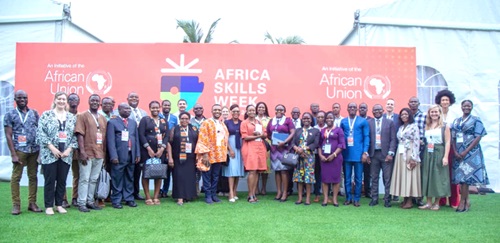
Panellists advocate enhanced private sector engagement in TVET
Panellists at a roundtable discussion on private sector engagement in Technical and Vocational Education and Training (TVET), have underscored the need for stronger public-private partnerships (PPPs) that align with current industry needs.
As a result, they have called for deeper engagement from businesses in curriculum development, internships, and on-the-job training opportunities to firm up their advocacy.
The panellists are a Skills Development Specialist from Don Bosco, Benedict Mensah; an expert in skills development, Dr Anthony Gewer; CEO of Design and Technology Institute (DTI), Constance Swaniker, and Gideon Murenga, an expert on skills development in GIZ Kenya.
The event, which brought together key industry and education stakeholders, was part of activities marking the Africa Skills Week. It was held at the La Palm Royal Hotel last Thursday.
It was organised by the Gesellschaft für Internationale Zusammenarbeit (GIZ) on behalf of the Pact for Skills Support to the Transformation of the TVET System Project. The Pact for Skills Support to the Transformation of the TVET System in Ghana project is co-funded by the German Ministry for Economic Cooperation and Development and the European Union and implemented by the Deutsche Gesellschaft für Internationale Zusammenarbeit (GIZ).
It aims to reform and strengthen Ghana’s Technical and Vocational Education and Training (TVET) system by fostering public-private partnerships, strenghthening the capacities of state agencies, digitalisation and integration of green skills into the technical education,while developing industry-relevant curriculums, and equipping the workforce with future-ready skills.
The discussion examined how partnerships can modernise Ghana’s TVET landscape and drive sustainable economic growth.
The panel also explored the potential for scaling TVET initiatives beyond Ghana, with Mr Murenga advocating greater regional cooperation to share best practices and foster innovation across African countries.
Needs
For Mr Murenga, the private sector's involvement should start with identifying skill needs, reviewing curricula and provide input to ensure that training aligns with current industry demands.
“For example, outdated curricula still include carburetors, even though the automotive industry has advanced far beyond that,” he said.
The private sector, he said, had so far contributed by signing Memoranda of Understanding with schools and establishing TVET industry coordination committees.
These committees, he said, brought together industry players and schools to make decisions about training implementation.
Aside from this, he proposed a training model which involves a rotation system, with students spending part of their time in school and part in the industry.
He said following the implementation of this model in his country, approximately 50 per cent of training takes place in the industry, where students receive practical exposure and mentorship from company employees.
“I encourage all stakeholders to support the TVET system so it can generate the workforce needed to make the country competitive and address unemployment. The TVET system can solve many challenges facing young people today,” he said.
Symbiotic
Mr Mensah explained that the relationship between industry, the government, and the schools was symbiotic in the TVET ecosystem, adding, “You cannot exclude one and rely on the others; they must work together”.
He added that in the Don Bosco system, the school had mechanisms that bridge the gap between training centres and industries.
One of such mechanisms, he mentioned, was the Job Service Officers who are institutionalised in the TVET system to guide young people through their TVET journey.
Local content
Ms Swaniker observed that when she set out, she did not understand why with a local content bill, Ghana had to rely on foreign labour.
That, she said, propelled her to establish the Design and Technology Institute.
The institute, she said, had collaborated with the Ghana Standards Authority, focusing on the crucial mindset shift around positioning and quality.
“We must empower young people not just to seek jobs but to create them,” she said, encouraging private companies to support hands-on learning and mentorship.
Transformation
For his part, the Dean of the School of Graduate Studies of the Akenten Appiah-Menka University of Skills Training and Entrepreneurial Education (AAMUSTED) and Head of Department of the Construction and Wood Technology Education, Professor Humphrey Danso, who was the keynote speaker, underscored the critical importance of private sector collaboration in transforming the TVET system.
He emphasised that without strong partnerships between businesses and TVET institutions, graduates may struggle to acquire the skills that industries demand.
“The partnership between the private sector and TVET institutions is a win-win for all. Institutions benefit from private sector expertise, the private sector gets skilled workers, and students are trained to meet industry demands,” he said.
